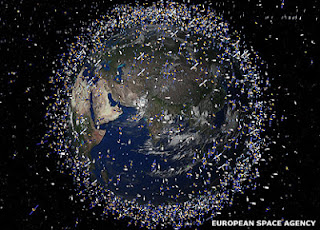'Space junk' refers to active or inactive satellites that have been launched or lowered from their orbits to be sunk in the sea, as well as old and working space rockets, and other objects resulting from the fragmentation of debris, generated for example in explosions.
The amount of space debris orbiting Earth has reached 16,530 pieces of satellite and rocket debris, 131 more than the last count made on June 30, according to the latest quarterly report from NASA's Orbital Debris Program, recently published.
Of the 16,530 space bodies in orbit around the planet, the Commonwealth of Independent States (CIS) – the United Kingdom and its colonies – remains the country that dumps the most waste into space compared to the previous quarter, with a total of 6,195 objects; followed by the United States with 4,945, and China with 3,726.
Meanwhile, the European Space Agency (ESA) remains the entity that emits the fewest objects into space, with only 86 bodies, one more than in 2011, and of which specifically 41 come from explosions and 45 are rockets, bodies and other debris.
There are countries that, regardless of the space agency to which they belong, also send and 'throw into Earth's orbit spacecraft. Thus, France contributes with 492 items of waste and the 199 from Japan are added to the 175 objects that originate in India.
This United States Government program aims to detect, control, catalog and identify these man-made objects that orbit the Earth, in order to predict when and where an object will fall back to Earth, what its position in space is, detect new residual bodies in space and to which country they belong, in addition to informing NASA if these objects interfere with the Shuttle station.
Fountain: INNOVATIVES
![]()

